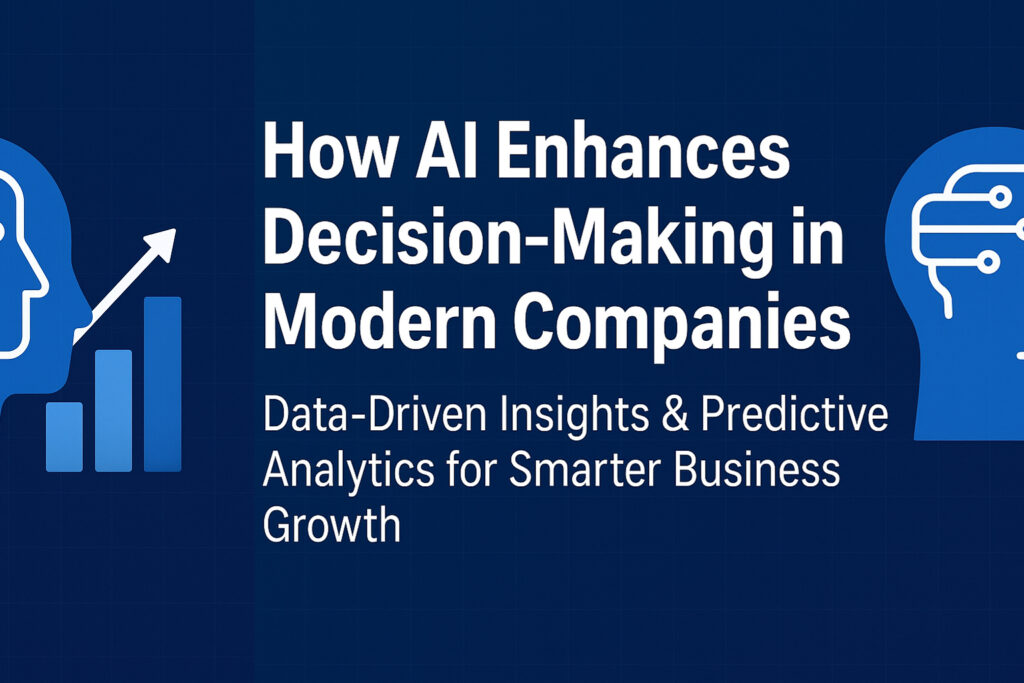How Artificial Intelligence Enhances Decision-Making in Modern Companies
Introduction
In today’s fast-paced digital era, business success heavily depends on how quickly and effectively decisions are made. Modern companies are no longer relying only on human intuition or traditional methods. Instead, they are leveraging the power of Artificial Intelligence (AI) to transform decision-making processes. AI empowers businesses to work smarter, not harder, by providing data-driven insights and predictive analytics that help leaders make accurate, strategic, and future-ready choices.
The Role of Artificial Intelligence in Business Decisions
Artificial Intelligence is not just about automation or robotics; it’s a technology that learns, analyzes, and improves with data. By processing vast amounts of information in seconds, AI allows businesses to make informed decisions faster than ever before. From marketing strategies to financial planning and customer engagement, AI tools are reshaping how modern companies operate.
Speed: AI analyzes real-time data without delays.
Accuracy: It reduces the chance of human errors in critical business decisions.
Scalability: AI works efficiently regardless of company size or complexity.
Why Modern Companies Rely on AI
Modern companies face a competitive global market where one wrong decision can cost millions. To stay ahead, businesses must focus on innovation, agility, and customer satisfaction. AI enables this by:
Predicting market trends through historical data.
Identifying customer behavior for personalized marketing.
Optimizing operations by automating repetitive tasks.
Improving risk management with predictive modeling.
This ability to turn raw data into meaningful strategies makes AI a vital part of modern decision-making.
Data-Driven Insights: The Foundation of Smarter Choices
One of the biggest advantages of AI is its ability to generate data-driven insights. Unlike traditional decision-making, which often relied on assumptions, AI uses real-time data to uncover hidden opportunities and challenges.
For example:
A retail company can analyze shopping patterns to recommend products customers are likely to buy.
A healthcare provider can use AI to detect early signs of disease from medical records.
A financial firm can identify fraudulent transactions before they happen.
By turning data into actionable strategies, AI allows modern companies to reduce risks while maximizing profits.
Predictive Analytics: Looking Into the Future
AI-driven predictive analytics is another game-changer for modern businesses. Predictive models use past and current data to forecast future outcomes, helping companies plan ahead with confidence.
Some real-world uses include:
Sales Forecasting: Predicting demand to avoid overstock or shortages.
Customer Retention: Identifying clients who are likely to leave and offering personalized solutions.
Risk Management: Assessing potential threats before they impact business operations.
With predictive analytics, decision-making becomes proactive instead of reactive, ensuring businesses are always one step ahead.
AI and Human Collaboration: A Balanced Approach
While AI offers powerful tools, it doesn’t replace human intelligence. Instead, it complements human judgment by providing the necessary data and predictions. The best decision-making happens when AI’s data-driven insights are combined with human creativity, intuition, and ethical considerations.
This collaboration ensures that decisions are not only logical but also aligned with company values and customer needs.
Conclusion
Artificial Intelligence has moved beyond being a futuristic concept—it is now an essential tool for modern companies aiming to succeed in a data-driven world. By leveraging AI for decision-making, businesses can achieve accuracy, efficiency, and innovation. From data-driven insights to predictive analytics, AI empowers leaders to make smarter choices that shape the future of industries.
FAQs (WH Questions)
1. What is the role of Artificial Intelligence in business decision-making?
AI helps businesses analyze large data sets, predict outcomes, and make more accurate and faster decisions.
2. Why do modern companies depend on AI for growth?
Because AI improves efficiency, reduces risks, and provides insights that support innovation and competitiveness.
3. How do data-driven insights help companies?
They allow businesses to base decisions on real facts and patterns rather than assumptions, reducing errors.
4. What is predictive analytics, and why is it important?
Predictive analytics uses past data to forecast future outcomes, helping businesses stay proactive in their strategies.
5. Can AI replace human decision-making completely?
No, AI complements human judgment by providing insights, but final decisions require human creativity, ethics, and emotional intelligence.
6. Which industries benefit most from AI in decision-making?
Healthcare, finance, retail, logistics, and marketing are some of the leading sectors using AI effectively.
7. How does AI improve customer satisfaction?
By analyzing customer behavior and offering personalized services, AI helps companies deliver better experiences.

